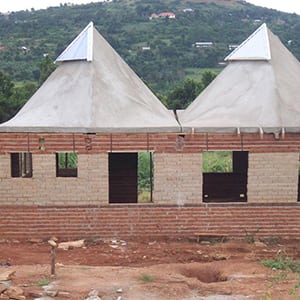
Agriculture
March 1, 2024
HyPar Thin Shell Concrete Roof
Read SolutionImplemented by
George Nez and Albert Knott
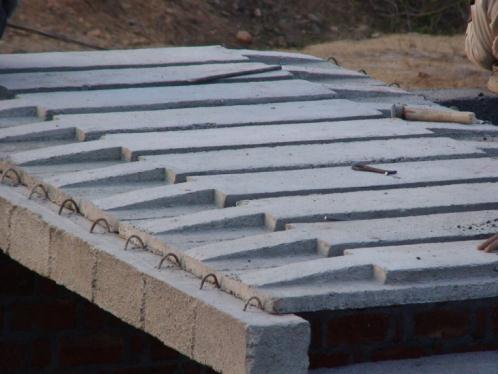
Updated on March 7, 2024
·Created on July 21, 2017
Precast concrete beams and slabs (or planks and joists) is a construction system comprised of precast concrete elements that span in modules between walls and are tied together with rebar that locks into a thin cast-in-place slab.
Precast concrete beams and slabs (or planks and joists) is a construction system that constitutes either precast concrete arched panels, hollow mini-slabs, or planks that are placed between smaller, more frequently spaced precast beams or joists that are spanning between walls or columns. A thin reinforced concrete layer is then poured on top. The precast system doesn’t require the extensive formwork of a cast-in-place concrete slab, and is more flexible for projects that need to be phased such as the improvement of buildings in informal settlements. An example of a manufacturer of precast concrete beams and slabs is Nyati Slabs in South Africa. It is also a common construction method in India.
Target SDGs
SDG 11: Sustainable Cities and Communities
Market Suggested Retail Price
$80.00
Target Users (Target Impact Group)
Household, Small and Medium-sized Enterprises, Public Sector Agencies
Distributors / Implementing Organizations
The manufacturers are the distributors of the product. The product can also be made on the construction site by an implementing NGO or general building contractor.
Regions
Africa, Asia
Manufacturing/Building Method
Made to order by a manufacturer and delivered to the construction site in pieces, or precast on site by a general building contractor. The pieces are then assembled on site and the final top layer of concrete is cast in place.
Intellectural Property Type
Open-source
User Provision Model
Users obtain the product directly from the manufacturer or through a general contractor.
Distributions to Date Status
Unknown.
Thermal Insulation Capacity
Low. Varies depending on thickness of beams and slabs. An 8″ uninsulated concrete wall has an approximate R-value of 1.35.
Compressive Strength (MPa)
Varies depending on the product and manufacturer. Concrete used in residential projects can have a compressive strength of 17 MPa to 28MPa.
Suitable Climates
Suitable for any climate.
Design Specifications
Precast elements come in all shapes and sizes. Some slab units are mini arched panels while others are hollow core and others are planks. Beams and joists either have a rectangular cross section or are the shape of T's both right-side up or upside-down. All precast components are individually reinforced with steel and specifications vary depending on local structural requirements and regulations. A slab is then poured on top of the system and thicknesses also vary.
Technical Support
Technical support would be provided by a general building contractor.
Replacement Components
Although the pieces are modular, because there is a thin slab poured on top of the assembly, it would be difficult to replace any components inside the system. It would be possible to buy new components from the manufacturer or precast new components on site for the later expansion of a building.
Lifecycle
If built to high quality standards, concrete can last for decades.
Manufacturer Specified Performance Parameters
Performance targets for this type of construction include affordability and flexibility in construction phasing.
Vetted Performance Status
Structural engineers should be consulted in the design of precast concrete slab/plank and beam/joist systems. Academic research has been performed related to precast concrete components (see Academic research section), but it does not necessarily inform construction projects, particularly in developing countries.
Safety
Workers are subject to the general risks of working from heights and with sharp tools.
Complementary Technical Systems
Precast concrete beams and slabs can be used with concrete block walls or cast concrete walls or columns, steel columns, or load-bearing brick walls.
Academic Research and References
Cavaco, E. 2017. Effects of corrosion on the behaviour of precast concrete floor systems.
Henin, E E A. 2012. Efficient precast/prestressed floor system for building construction. The University of Nebraska – Lincoln, ProQuest Dissertations Publishing.
NRMC, 2014, CIP 35 – Testing Compressive Strength of Concrete
Nyati Slabs Brochure
ACI Committee 365, Service-Life Prediction—State-of-the-Art Report
Bureau of Indian Standards, 1994, IS 13994: Design and Construction of Floor and Roof with Precast Reinforced Concrete Planks and Joists – Code of Practice
Madel, Noes, 2015, Top 6 Important Quality tests of Concrete
Compliance with regulations
Regulations vary by country. The Precast/Prestressed Concrete Institute offers guide specifications for architectural and structural precast concrete.
India also has standards for precast reinforced concrete planks and joists.
Evaluation methods
Similar to other concrete construction, tests should be conducted to determine concrete quality.
Other Information
Another method of onsite casting involves casting sections of slab one on top of the other and then moving the section into place. The sections can be cast solid or on top of a styrofoam layer.
“Housing”, Society for Enviroment Protection India, accessed on March 7, 2024, https://sepindia.org/housing/cost-effective-environment-friendly-construction-technologies/
“Product Range”, Nyati Slabs, accessed on March 7, 2024, https://nyatislabs.co.za/product-range/
“Precast Concrete Floor Slab Cost”, Turtle Creek Software, accessed on March 7, 2024, https://www.turtlesoft.com/Construction-Costs/Concrete/Precast_Floor_Slab.htm
“R-Value of Concrete”, Concrete Construction, accessed on March 7, 2024, https://www.concreteconstruction.net/how-to/r-value-of-concrete_o

Agriculture
March 1, 2024
Implemented by
George Nez and Albert Knott
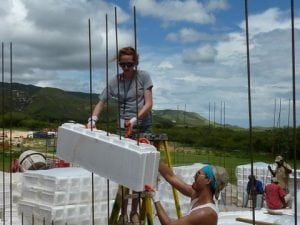
Agriculture
March 4, 2024
Implemented by
Lazarian World Homes
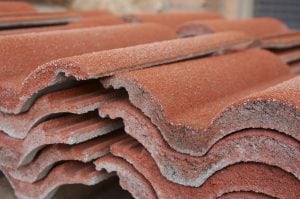
Agriculture
March 6, 2024
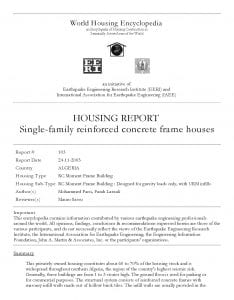
Agriculture
February 19, 2024
Implemented by
Earthquake Engineering Research Institute (EERI)

Agriculture
November 30, 2024
Implemented by
Sustainable Community Development Services (SCODE)
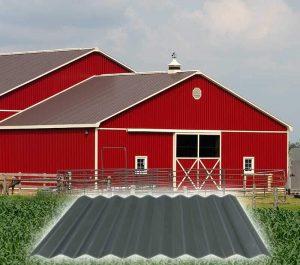
Agriculture
February 28, 2024
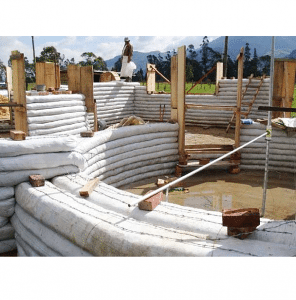
Agriculture
February 29, 2024
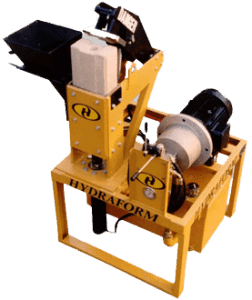
Agriculture
February 29, 2024
Implemented by
Hydraform
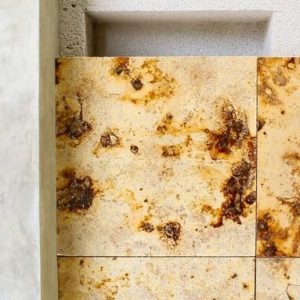
Agriculture
March 13, 2024
Implemented by
Mycotech Lab (MYCL)
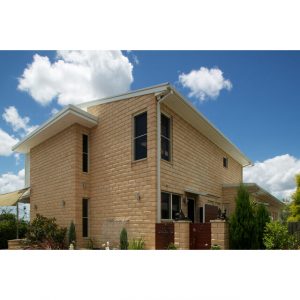
Agriculture
March 14, 2024
Implemented by
Timbercrete
Have thoughts on how we can improve?
Give Us Feedback